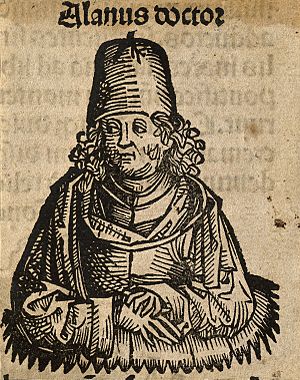Alain de Lille facts for kids
Quick facts for kids
Alain de Lille
|
|
|---|---|
 |
|
| Born | 1128 Lille, France
|
| Died | 1202-1203 |
| Alma mater | University of Paris |
| Era | Medieval philosophy |
| Scientific career | |
| Influences |
|
Alain de Lille (also known as Alan of Lille) was a French thinker and poet. He was born around 1128 in Lille, France. He passed away between 1202 and 1203.
Alain is famous for his writings based on the "liberal arts." These were important subjects like grammar, logic, and math. One of his most well-known poems is De planctu Naturae (The Complaint of Nature). Even though he was very famous in his time, we don't know much about his personal life. Most of what we know comes from his writings.
As a theologian, someone who studies religion, Alain de Lille had different ideas from many others in the 1100s. He believed that human reason could figure out many truths about the world. But to understand God and religious truths, he felt that faith was also needed.
Contents
Life of a Universal Teacher
We don't know many details about Alain's early life. He likely started studying in the late 1140s. He went to schools in Paris and Chartres. He might have learned from famous teachers like Peter Abelard.
Alain spent many years teaching Theology at the University of Paris. He even attended an important church meeting, the Lateran Council, in 1179. People said his teaching style was unique. He was good friends with other teachers in Paris. He taught there and in southern France until he was old. Later, he moved to Montpellier and then retired to a monastery called Cîteaux, where he died.
Alain was very well-known during his lifetime. People called him Doctor Universalis, which means "Universal Teacher." This shows how much knowledge he had. Many of his works don't have exact dates. But his first major work, Summa Quoniam Homines, was likely finished around 1160. He probably developed it from his lectures in Paris.
Among his many writings, two poems are very important in Latin literature from the Middle Ages. One is De planctu Naturae, which cleverly criticizes human flaws. The other is Anticlaudianus. This poem teaches about morals using allegory, a story with a hidden meaning.
Ideas on Faith and Reason
Alain de Lille's ideas were a mix of Aristotelian logic and Neoplatonic philosophy. He believed that God is pure understanding. He used logic and Pythagorean math to explain this.
In his work Anticlaudianus, Alain explained his main idea. He thought that reason, guided by good judgment, could discover most truths about the physical world on its own. But to understand religious truths, people needed to rely on faith. He even tried to prove religious beliefs using math-like steps, with terms like "axiom" and "theorem." This was a very bold idea for his time.
Important Works
One of Alain's most famous works is De planctu Naturae (The Plaint of Nature). He wrote it in the late 1160s. In this work, he uses both prose and poetry. He shows how nature sees itself as less powerful than God. He also talks about how humans have strayed from nature and God.
Another key work is Anticlaudianus. In this poem, nature realizes it can only create a body without a soul. So, nature decides to travel to heaven to ask for a soul. The Seven Liberal Arts help her by creating a chariot. The Five Senses become the horses pulling it. This work was so popular that it was translated into French and German.
Alain also wrote a very popular guide on how to preach, called Ars Praedicandi (The Art of Preaching). He believed that understanding theology was key to good preaching. This book was a practical guide for church leaders to prepare sermons.
He wrote three large theology textbooks. His first was Summa Quoniam Homines. Another, De Fide Catholica, written between 1185 and 1200, aimed to correct wrong religious ideas, especially those of the Waldensians and Cathars. His third textbook, Regulae Caelestis Iuris, presented theological rules. Alain also wrote many other works, including poems and texts on moral and speculative theology.
It's important to know that Alain de Lille has sometimes been confused with other people named Alain. Some works were wrongly thought to be his. For example, The Life of St Bernard was written by Alain of Auxerre. However, it is now clear that Alain de Lille wrote Ars catholicae fidei and Contra haereticos. He also wrote a work against Islam, Judaism, and Christian heretics.
List of Known Works
- De planctu Naturae
- Anticlaudianus
- Rhythmus de Incarnatione et de Septem Artibus
- De Miseria Mundi
- Quaestiones Alani Textes
- Summa Quoniam Homines
- Regulae Theologicae
- Hierarchia Alani
- De Fide Catholica: Contra Haereticos, Valdenses, Iudaeos et Paganos
- De Virtutibus, de Vitiis, de Donis Spiritus Sancti
- Liber Parabolarum
- Distinctiones Dictionum Theologicalium
- Elucidatio in Cantica Canticorum
- Glosatura super Cantica
- Expositio of the Pater Noster
- Expositiones of the Nicene and Apostolic Creeds
- Expositio Prosae de Angelis
- Quod non-est celebrandum bis in die
- Liber Poenitentialis
- Ars Praedicandi
- Sermones
Translations
- Alan of Lille, A Concise Explanation of the Song of Songs in Praise of the Virgin Mary, translated by Denys Turner, in Denys Turner, Eros and Allegory: Medieval Exegesis of the Song of Songs, (Kalamazoo, MI: Cistercian Publications, 1995), 291–308
- The Plaint of Nature, translated by James J Sheridan, (Toronto: Pontifical Institute of Mediaeval Studies, 1980)
- Anticlaudian: Prologue, Argument and Nine Books, edited by W. H. Cornog, (Philadelphia, 1935)
Images for kids
See also
 In Spanish: Alain de Lille para niños
In Spanish: Alain de Lille para niños


